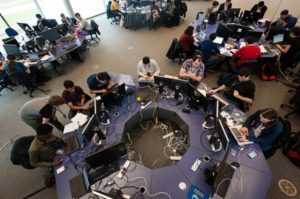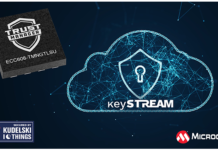
Inter-ACE 2017 – Hackathons have become increasingly common in recent years, and I’ve written before about their growing popularity as a means by which to locate, and subsequently recruit, the best tech talent in your field. These events, which are typically held over a weekend, usually involve some open data and some rapid prototyping to develop rough and ready solutions that can then hopefully be developed further.
In terms of nomenclature, the hacking is more in the sense of hacking something together very quickly than in the more commonly used sense of trying to break into a computer system illegally.
Hacking challenge
The Inter-ACE Cyber challenge, which was held at the University of Cambridge last weekend, is a kind of hackathon that’s more in tune with what we come to know as hacking.
It’s a competition that was born last year as a Cambridge v Cambridge battle, that saw the finest hackers from Cambridge University and MIT do battle. This year, the event was opened up to have a preliminary stage that featured teams from 12 universities who have been designated as Academic Centres of Excellence in Cyber Security Research.
Whilst the event itself was hosted at Cambridge’s William Gates computer science lab, all of the action took place within the CyberNEXS platform of event sponsor Leidos. This is a virtual environment where a number of ‘cyber war games’ can be conducted.
For Inter-ACE, the game revolved around a fictional power company that had experienced a number of cyber-attacks that threatened not only the company’s nuclear facilities, but also therefore critical pieces of national infrastructure.
The teams were tasked with re-gaining access to the networks and then securing them from further incursions, whilst maintaining the accessibility of network services. Points were scored for a wide range of things, with the leaderboard updated constantly throughout the afternoon. At stake was the £6,500 first prize.
“Leidos is a strong supporter of STEM activities, and sees its importance in attracting and inspiring cybersecurity talent. By introducing students and professionals to CyberNEXS, we hope to increase their interest in this evolving field, and grow the future workforce to support critical global missions,” Leidos say.
Cutting edge talent
Over 100 of the finest minds in the U.K. participated in event, with the victorious team heralding from Imperial College London. With over two-thirds of companies revealing difficulties attracting the skills required to ensure their IT systems are safe from attack, such events can be crucial in identifying the best talent in your industry.
The winning team, called QWERTY, consisted of a trio of computer science students. Luke Granger-Brown, 22, who is studying computing; Jaime Rodriguez, 21, who is studying computing and Maths; and Madalina Sas, 23, who is studying computing.
“It has been an incredible competition, and I’m surprised we won. We would encourage everyone to participate who can in the next competition, as it’s a great way to put the stuff we have learnt at university into practice,” Granger-Brown said.
They are now guaranteed a spot in the prestigious Cambridge2Cambridge (C2C) competition that will be held later this summer. The competition will bring together the best cyber defenders from both the U.K. and US to both show off their skills and learn new tricks of the trade. It’s expected to attract a number of interested spectators from across industry and government, eager to see the best young talent in action.
“The cyber security industry requires a range of skills that are not purely technical. From psychology and behavioral science, to leadership and business insights – a variety of skills will be key for the cyber security workforce of the future. Inter-ACE gives pupils the opportunity to implement the skills and theory they have been taught at university in a realistic environment, while learning new ones in the process, which will help grow them in to the cyber defenders of the future. It also teaches them to adapt to their surroundings and think on their feet, priming students to be trained in industry and make a real impact,” Dr Frank Stajano, Founder of Inter-ACE and Reader in Security and Privacy at the University of Cambridge, says.
Source: https://www.forbes.com

















